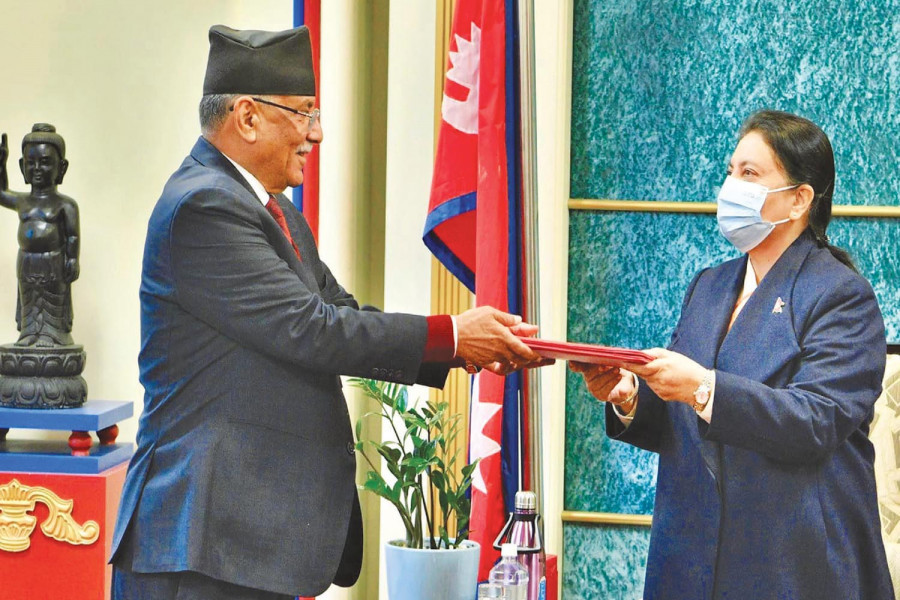Columns
Strengthening federalism
Reforming the electoral system is a vital condition for the stability of federalism.
Khim Lal Devkota
Third-time Prime Minister Pushpa Kamal Dahal “Prachanda” has many things to do, including government reform.
First, he needs to pay attention to the functioning of the inter-governmental coordination level institutions, including the inter-provincial council. The inter-provincial council is chaired by the prime minister and consists of the home minister, finance minister and the chief ministers as members. The last time it met was in 2019.
There is also a national coordination council, which is chaired by the prime minister and includes the leader of the opposition in Parliament and local representatives, among others. It has never held a meeting.
Apart from these two councils, there are sectoral thematic committees under the chairmanship of the concerned ministers such as an inter-governmental fiscal council and the provincial coordination council chaired by the finance minister and the chief minister, respectively. The experience of other federal countries shows that inter-governmental institutions are very important for the institutionalisation of federalism.
There are complaints that the federal government has interfered with the jurisdiction of the subnational governments by considering the matters under concurrent rights as an exclusive right, misinterpreting the matters under the fundamental rights, and centralising the responsibilities of the local level. It is crucial to clarify this on the basis of field observations.
Fewer ministers
Another important task for this government is amending the constitution to limit the number of ministers in the provinces. The parliamentary committee in the National Assembly has recommended that the number of ministers be limited to 10 percent of the members of the Provincial Assembly.
The committee has also recommended limiting the number of central ministries to 15, but the government tried to increase it from 21 to 25 instead, and only backed down after widespread opposition.
The federal government has about five dozen departments, more than half of which are ineffective. It is not good to maintain many ministries, departments and agencies at the centre as work and responsibilities have been devolved to the provincial and local levels.
A common complaint is that government officials are hostile to the spirit of the federalism. Neither the government officials nor the elected representatives at the subnational levels are happy with the existing administrative system. Special attention needs to be given to the formation of a high-level administration reform commission under the chairmanship of the prime minister to reform the entire bureaucracy.
The Dahal administration should be serious about passing laws. Some essential laws for the functioning of federalism have not yet been enacted. For example, the federal civil service law is yet to be drafted. It has a negative impact at the ward level.
Even the law related to local service arrangements has not been made. According to the constitution, the local level has the right to provide education up to the secondary level, but the federal education law has not yet been enacted. Since the federal law on concurrent rights between federal units has not been passed, the subnational levels have not been able to enact laws. Unless the law-making process is speeded up, this governance system will not yield the expected results.
The constitution provides the provinces exclusive rights over the provincial police administration and security. But even after five years of federalism, the police force has not been adjusted in the provinces. This government must adjust the police force in the provinces. This is an important issue that the provinces have been raising from the very beginning.
Reforming the electoral system is a vital condition for the stability of the federal system. This requires a fully first-past-the-post electoral or fully proportional electoral system. Inclusion issues should be incorporated into the first-past-the-post electoral system.
The biggest problem for the different tiers of government is duplication in the selection and implementation of programmes and projects. As per the constitution, the federal government will only formulate and implement plans and programmes of strategic importance. But in practice, the federal government has been engaging in petty programmes and projects.
Programmes and projects
In the current fiscal 2022-23, some programmes and projects such as drinking water, irrigation, urban development, tourism and river control were given to the subnational governments. The subnational levels had also begun the work of issuing contracts for such schemes. Then the government decided to take back these programmes and projects. This has not only insulted and devalued Parliament, but also dealt a big blow to federalism. This administration should correct the wrong decision of its predecessor, and allow the projects to be implemented as per the budget speech.
The parliamentary Monitoring Committee on the Implementation of Federalism of the National Assembly has also requested the varied tiers of government to set benchmarks for their programmes and projects. They should do this as soon as possible;, and until then, follow the advice of the parliamentary committee.
The problem of land acquisition is a big hindrance in the construction of office buildings at the subnational levels. Lack of land has discouraged investors, industrialists and businessmen from coming to the provinces. The government needs to pay attention to this issue too.
There are many things that need to be done to fully implement federalism. If the stakeholders think seriously about federalism, the problems seen in its implementation will be resolved.




 8.67°C Kathmandu
8.67°C Kathmandu















